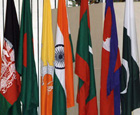
Feeling the heat of terror attack all the eight members of the SAARC (South Asian Association for Regional Cooperation) countries unanimously discarded all forms of terrorist violence and pledged utmost possible cooperation to counter the menace of terrorism. The negotiations over the exchange of information on terrorism and organised crime concluded with the approval of “extradition clause.”
The two-day 15th SAARC summit concluded on Sunday with “Colombo Declaration” titled “Partnership for Growth for Our People” signed by foreign ministers of eight member nations.
The representative heads of SAARC nations also approved four agreements comprising the establishment of a SAARC Development Fund, the creation of South Asian Standards Co-ordination, South Asian Mutual Legal Assistance on Criminal Matters and Protocol of Afghanistan’s accession to South Asian Free Trade Agreement (SAFTA).
Amid a number of declarations, the highlight of the 15th SAARC summit however remained the “Extradition Clause-handling over of terrorists and criminals” and the “Mutual Legal Assistance on Criminal Matters” which was incorporated after hard negotiations to check terrorism and trans-national organised crime.
Realising the shortage of food items the member-countries also insisted on the urgent operationalisation of “SAARC Food Bank” and drawing up of the SAARC Agriculture Perspective 2020.
The joint projects would work for augmentation in food production, investment in agriculture and related industries, agriculture research and prevention of soil degradation, sharing of technologies, assistance in procurement and distribution, and management of climatic and disease-related risks in agriculture.
The eight page Colombo declaration titled “Partnership for Growth for Our People” signed by the foreign ministers of the eight member nations said: “The heads of state or government reaffirmed their commitment to the principles and objectives in the SAARC Charter. The leaders pledged their commitment for collective regional efforts to accelerate economic growth, social progress and cultural development.”
The 15th SAARC summit also witnessed its increasing popularity across the globe with the accessions of Australia and Myanmar to the organisation as new Observers. Before their inclusion, the SAARC had seven observers namely, United States, European Union, China, Japan, South Korea, Mauritius and Iran.
In a nutshell, the focuses were laid at the summit includes poverty alleviation, food security, energy crisis, climate change and terrorism.
The summit decided to move the 16th SAARC summit to be held next year in Maldivian capital, Male.
SAARC summit: A brief look
The South Asian Association for Regional Cooperation (SAARC) is the largest regional organisation in the world with roughly covering a population of 1.47 billion. It was established on December 8, 1985 with the initiatives of eco-politico organisation of seven southern Asian countries, namely, India, Pakistan, Bangladesh, Sri Lanka, Maldives and Bhutan. Afghanistan became its 8th member at 14th summit held at New Delhi in April 2007.
The objectives of the SAARC is embedded in its charter which outlines the welfare of the peoples of South Asia and to improve their quality of life, the respect for the principles of sovereign equality, territorial integrity, political independence, non-interference in internal affairs to each other countries and to cooperate with international and regional organisations with similar aims and purposes. The Charter also directs the heads of the member-nations to meet once a year or more, if considered deemed necessary by the members.
|
|


Comments: